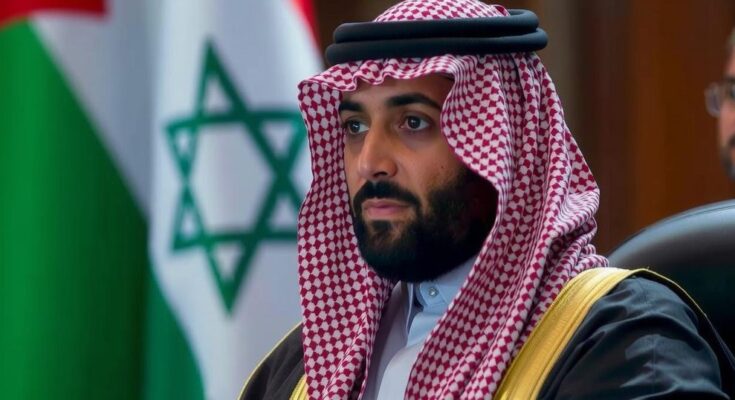Saudi Crown Prince Mohammed bin Salman has labeled Israeli actions in Gaza as “genocide,” during a summit with Arab leaders, while calling for a complete withdrawal from occupied territories. The Saudi Foreign Minister criticized the international community’s inaction, highlighting the humanitarian crisis in Gaza. The recent conflict began with Hamas’s attack on Israel and has resulted in large-scale fatalities. The summit reflects a united Arab front seeking to address ongoing violence and instability in the region.
Saudi Crown Prince Mohammed bin Salman has publicly condemned Israeli actions in Gaza as “genocide,” marking a significant escalation in criticism from Saudi Arabia since the onset of the ongoing conflict. During a summit of Arab and Muslim leaders, he not only denounced the situation in Gaza but also criticized Israel’s military strikes in Lebanon and Iran. The Crown Prince notably urged for a complete Israeli withdrawal from both the West Bank and Gaza, reflecting a united stance among Gulf leaders. Saudi Arabia’s Foreign Minister, Prince Faisal Bin Farhan Al-Saud, echoed these sentiments, highlighting the failure of the international community to halt the violence in Gaza and accusing Israel of causing severe humanitarian crises, including starvation. He stated, “Where the international community primarily has failed is ending the immediate conflict and putting an end to Israel’s aggression.” The conflict was ignited following Hamas’s attack on Israel on October 7, 2023, resulting in substantial casualties. In retaliation, Israel initiated a campaign to dismantle Hamas, with reports indicating that over 43,400 individuals have died in Gaza amid ongoing bombardments. The UN’s Human Rights Office has noted that a large proportion of the victims are women and children. The summit leaders also condemned Israel’s repeated assaults on UN personnel and facilities within Gaza. Recent legislative actions by the Knesset, which aim to restrict operations of the UN Palestinian refugee agency, have further raised alarms among the international community, including the United States and the United Kingdom, due to concerns about hindered humanitarian assistance. Amid these tensions, discussions regarding the potential implications of Donald Trump’s return to power are ongoing, with Gulf leaders expressing a desire for stability and an end to regional conflicts, leveraging his influence in the area. While Trump is viewed more favorably in Saudi Arabia compared to President Joe Biden, his historical relationship with the Middle East is complicated, particularly in light of his previous recognition of Jerusalem as Israel’s capital and the implications of the Abraham Accords negotiated in 2020.
The backdrop of the current diplomatic tensions stems from the intensifying conflict between Israel and Hamas, which began with a surprise attack by Hamas resulting in a significant loss of life in Israel. Israel’s subsequent military response has led to catastrophic conditions in Gaza, sparking international outcry and accusations of human rights violations. The Saudi leadership’s response reflects a shift in Arab attitudes towards Israel and broader geopolitical dynamics, particularly in connection to the United States and the evolving relationships in the region, including Iran’s role.
In conclusion, Crown Prince Mohammed bin Salman’s strong denunciation of Israel’s actions as “genocide” marks a pivotal moment in Saudi Arabia’s stance on the conflict, alongside calls for an end to hostilities and increased international intervention. As discussions surrounding Donald Trump’s potential influence grow, Gulf leaders see an opportunity for renewed efforts toward stability in the region amid ongoing humanitarian crises. The situation remains delicate, requiring sustained international focus and dialogue to navigate the complexities involved.
Original Source: www.bbc.co.uk



